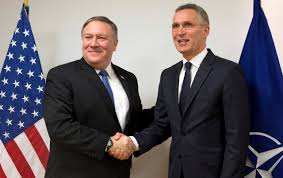BRUSSELS, July 10 (Reuters) – U.S. Secretary of State Mike Pompeo arrived in Brussels on Tuesday, where he plans meetings on the sidelines of the NATO summit aimed at stepping up pressure on Iran and reassuring allies about alternative oil supplies, a State Department official said.
Pompeo flew from Abu Dhabi, where he discussed Iran with leaders of the United Arab Emirates. Senior State Department officials have also completed three days of talks on Iran in Saudi Arabia, and “discussed new ways to deprive the regime of revenues,” a State Department official told reporters traveling on Pompeo’s plane.
“In our meeting with the Saudi energy minister, we discussed maintaining a well-stocked oil market to guard against volatility,” he said. “We discussed U.S. oil sanctions to deny Iran revenue to fight against terrorism. We talked about minimizing market disruptions and helping partners find alternatives to Iran oil.”
At NATO, Pompeo would discuss Iran with ministers from Britain, France and Germany, and in other bilateral meetings, said the official, who spoke on condition of anonymity.
He said a meeting with political directors of the so-called E-3 countries of France, Germany and Britain, who signed an international agreement on Iran that the Trump administration has withdrawn from, would now be held in Brussels on Wednesday or Thursday. He said it was postponed for a couple of days due to scheduling issues.

The United States pulled out of a multinational deal in May to lift sanctions against Iran in return for curbs to its nuclear program. Washington has since told countries they must halt all imports of Iranian oil from Nov. 4 or face U.S. financial measures, with no exemptions.
Since Trump’s decision to withdraw from the agreement, European states have been scrambling to ensure Iran gets enough economic benefits to persuade it to maintain the nuclear curbs required in the deal.
But so far it has proven difficult to offset the impact of continued U.S. sanctions, with European firms reluctant to risk far-reaching U.S. financial penalties to do business in Iran.
“No matter how much people write about trans-Atlantic rifts, in the case of Iran we agree on much more than we disagree,” the U.S. official said. “The European nations are as frustrated as we are with Iran’s missile program, the missile attacks that they are facilitating.”
(Reporting by David Brunnstrom; Editing by David Alexander; Editing by Cynthia Osterman)

